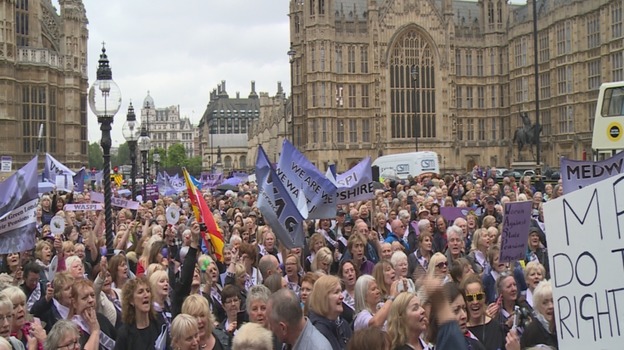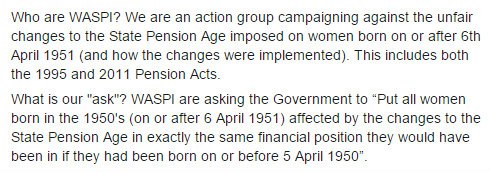As my readers will know, I have been watching the WASPI campaign with a growing sense of despair. Every attempt to find a realistic solution to their issue fails because it does not meet their demand for "fair transitional arrangements". But they have steadfastly refused to say what "fair transitional arrangements" are - at least publicly.The 1995 Pensions Act included transitional arrangements. The rises in women's state pension age (SPA) did not start for 15 years after the Act was passed, so did not affect women born prior to April 1950. And women's SPA was to rise gradually from 60 to 65 over the course of 10 years, from 2010 to 2020. The 2011 Pensions Act accelerated the transition and added an extra year to the SPA for men and women born from 1955 onwards.Like many, I think the 2011 Pensions Act was unfair, increasing the SPA for some women by up to 18 months ON TOP OF the 1995 Pensions Act rise, with very little notice. I support a campaign to have the 2011 acceleration relaxed or - ideally - overturned. Some might ask, therefore, why I oppose WASPI.My opposition to WASPI stems from the fact that the co-founders are not fundamentally interested in the 2011 acceleration. Their target is the 1995 Act.This was clear from their original "ask". And it is now abundantly clear that they have not deviated from that position. They have simply concealed it.
Topics:
Frances Coppola considers the following as important: pensions, WASPI
This could be interesting, too:
Nick Falvo writes Homelessness among older persons
Frances Coppola writes We need to talk about the state pension
Frances Coppola writes WASPI Campaign’s legal action is morally wrong
Frances Coppola writes Statistics for state pension age campaigners
As my readers will know, I have been watching the WASPI campaign with a growing sense of despair. Every attempt to find a realistic solution to their issue fails because it does not meet their demand for "fair transitional arrangements". But they have steadfastly refused to say what "fair transitional arrangements" are - at least publicly.
The 1995 Pensions Act included transitional arrangements. The rises in women's state pension age (SPA) did not start for 15 years after the Act was passed, so did not affect women born prior to April 1950. And women's SPA was to rise gradually from 60 to 65 over the course of 10 years, from 2010 to 2020. The 2011 Pensions Act accelerated the transition and added an extra year to the SPA for men and women born from 1955 onwards.
Like many, I think the 2011 Pensions Act was unfair, increasing the SPA for some women by up to 18 months ON TOP OF the 1995 Pensions Act rise, with very little notice. I support a campaign to have the 2011 acceleration relaxed or - ideally - overturned. Some might ask, therefore, why I oppose WASPI.
My opposition to WASPI stems from the fact that the co-founders are not fundamentally interested in the 2011 acceleration. Their target is the 1995 Act.
This was clear from their original "ask". And it is now abundantly clear that they have not deviated from that position. They have simply concealed it.
This was reiterated by Anne Keen, one of the five WASPI co-founders, in her verbal evidence to the WPSC in December 2015, a written transcript of which is in the public domain:
Basically, what we are asking—and we feel this is a very fair ask—is for the Government to put all women in their 50s, born on or after 6 April 1951 and affected by the state pension age in exactly the same position they would have been in had they been born on or before 5 April 1950. As Lin has touched upon, we have worked since we were 15 and we have built up over 40 years’ worth of National Insurance contributions now. All of our working lives we expected to receive our pension when we were 60. Nobody told us any different. Although there was not a written contract as such, there was a psychological contract. All of our working lives we were told, “You will get your pension when you are 60”.But when Richard Graham MP and Baroness Altmann, among others, pointed out that this amounted to rolling back the 1995 Pensions Act, WASPI fiercely denied it, claiming that they were in favour of equalisation and did not want the 1995 Act overturned. All they wanted was "fair transitional arrangements" - whatever those are.
And we now know what those are. Yesterday, this was posted on the WASPI Facebook group:
REMINDER - AIMS OF WASPI CAMPAIGN - UPDATED
Can we remind everyone of the specifics and objectives of our campaign which are clearly communicated on our web site (and in the wording of the petition):"The Government must make fair transitional arrangements for all women (born in the 1950s) on or after 6th April 1951 who have unfairly borne the burden of the increase to the State Pension Age (SPA)".
And this:
This is what the campaign is fighting for and will continue to fight for. However, other options are being suggested by supporters and MP's which are not in line with the aims of the WASPI campaign or the APPG. We can no longer tolerate individuals sending out mixed messages and compromises. Such a disunited approach is damaging and gives the government an opportunity to attack and oppose our campaign.It should be noted that WASPI is the only campaign group for 1950s women to have achieved any level of success over the past year, with 4 debates in Parliament, 120+ supportive MPs, numerous votes of support from local councils, an ongoing petition, the APPG and the start of a mass complaint to the Parliamentary Ombudsman.
Anyone not agreeing with these objectives or wishing to pursue other goals or agenda will be invited to leave the WASPI Campaign.
Celia & Anne
Some clarity from Anne Keen as to what transitional arrangements are being asked for;Transitional Arrangements
There is still some confusion regarding our ask - "The Government must make fair transitional arrangements for all women born on or after 6th April 1951 who have unfairly borne the burden of the increase to the State Pension Age (SPA)"So what do we mean by transitional arrangements?
Transitional, as the word implies, is an arrangement to move women from one stage to the next. In relation to our campaign we mean a financial arrangement to move them from the date when they expected to receive their State Pension (60 years) to their new State Pension age (for example, 66 years).
In this example, the woman concerned would need an income for 6 years from age 60 to 66 years to replace the expected State Pension income that has been lost. On reaching State Pension age, the transitional arrangement would cease and the woman would receive her State Pension in full. WASPI is also seeking financial recompense for “lost” state pension.
Several options that reflect our aim and that of APPG have already been suggested:- Barbara Keeley’s bridge pension and Owen Smith 70% / 30% option (made to his constituents after the last debate) and the **JSA option encompass transitional arrangements i.e. to summarise, a reduced pension/payment made at aged 60 until the new SPA is reached, whereupon a full state pension will be made. WASPI are also seeking financial recompense, for 'lost" pension.
Options mentioned by Owen Smith at the last debate were not transitional. Neither is the one suggested by Frank Field/Work and Pensions Select Committee.
Many non-supportive MP's deliberately misconstrue our ask by saying we want the law reversing. We don't. We are campaigning for transitional arrangements as specified above that are not means tested.
Unfortunately, the government have yet to acknowledge that we have been treated unfairly despite the fact that we are not asking for anything that we do not have a fundamental right to.
* The APPG party has been formed to:- “To provide a cross-party forum in which to hold the government to account on the issue of transitional arrangements to compensate 1950s-born women who are affected by changes to the State Pension Age and to campaign on issues around the State Pension Age".
**JSA rates from aged 60 until new SPA. Not means-tested and not subject to any JSA “conditions”.I want to draw your attention to the following two clauses in the second post above, which I have highlighted:
"...the woman concerned would need an income for 6 years from age 60 to 66 years to replace the expected State Pension income that has been lost."
"WASPI is also seeking financial recompense for “lost” state pension."
These two together amount to a demand for the financial equivalent of full state pension from age 60 for all women born in the 1950s. The "income" may be less, but the "financial recompense" would top it up to the full amount. In other words, they add up to the original "ask" as explained by Anne Keen in her evidence to the WPSC, quoted above.
So this group of women is demanding special treatment. Effectively, they want the 1995 Pensions Act to apply to everyone except them.They are even happy for it to apply to some older women, since they specifically exclude those born April 1950-March 1951 from their campaign.
The essence of the WASPI campaign's case is that the DWP failed to inform 1950s women individually about the SPA rises in the 1995 Pension Act. This is true. But bad communication does not justify excluding 1950s women from the provisions of the 1995 Act. The most it might create is some moral obligation to provide targeted relief to women who face genuine hardship because they had expected to receive state pension at 60 and have no other possible source of income. Anything more would disadvantage younger women, who also suffer the effects of the 1995 Act and who also did not receive (and in most cases still have not received) individual communications about SPA rises. And it would add to the burden of unaffordable payments to older people that younger generations must support. It would be wholly unfair and highly regressive.
When I pointed out that their demand would impoverish younger women who are at least as badly affected by the 1995 Act as they are, WASPI laughed it off, suggesting that those women should "start their own campaign". And when I suggested that uprating working-age benefits such as JSA and ESA would support those women who are genuinely facing hardship, they dismissed this as unacceptable because many of them would not qualify for assistance. They reject out of hand realistic proposals that would genuinely help women in difficulty, because that would mean no money for the rest of them. They are staggeringly selfish and greedy. They would be better named GRASPI than WASPI.
Now we know what the WASPI campaign's demand really is, we can reject it with a clear conscience. So let's focus on overturning the unfair 2011 Pensions Act, shall we? And ending the brutal sanctions regime for JSA and ESA? And stopping the cuts to working tax credits?
Good, that's settled then.
Related reading:
What WASPI really want - the WASPI ask in full - Cash for Questions
The angry WASPIs
Here I stand, I can do no other
What they really want
Kafka at the DWP
Image from itv.com.


